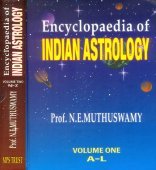Nal, Ṇal, Ñāl, Ñāḻ, Naḷ: 14 definitions
Introduction:
Nal means something in Hinduism, Sanskrit, Hindi, biology, Tamil. If you want to know the exact meaning, history, etymology or English translation of this term then check out the descriptions on this page. Add your comment or reference to a book if you want to contribute to this summary article.
The Sanskrit term Naḷ can be transliterated into English as Nal or Nali, using the IAST transliteration scheme (?).
Images (photo gallery)
In Hinduism
Vyakarana (Sanskrit grammar)
Source: Wikisource: A dictionary of Sanskrit grammarṆal (णल्).—Personal ending अ (a) substituted for तिप् (tip) and मिप् (mip) in लिट् (liṭ) or the perfect, and in the case of विद् (vid) and ,ब्रू (brū) in लट् (laṭ) or the pres. tense optionally; cf P. III, 4. 82, 83, 84. The affix णल् (ṇal) on account of being marked by the mute letter ण् (ṇ) causes vrddhi to the preceding vowel; the vrddhi is, however, optional in the case of the 1st pers. (मिप् (mip)) cf. P. VII.1.91. औ (au) is substituted for णल् (ṇal) after roots ending in आ; cf. P. VII .1.34.

Vyakarana (व्याकरण, vyākaraṇa) refers to Sanskrit grammar and represents one of the six additional sciences (vedanga) to be studied along with the Vedas. Vyakarana concerns itself with the rules of Sanskrit grammar and linguistic analysis in order to establish the correct context of words and sentences.
Biology (plants and animals)
Source: Wisdom Library: Local Names of Plants and DrugsNal in the Hindi language is the name of a plant identified with Arundo donax L. from the Poaceae (Grass) family having the following synonyms: Donax arundinaceus, Donax sativa, Arundo bengalensis. For the possible medicinal usage of nal, you can check this page for potential sources and references, although be aware that any some or none of the side-effects may not be mentioned here, wether they be harmful or beneficial to health.
Nal in the Marathi language, ibid. previous identification.
Nal in the Assamese language is the name of a plant identified with Nymphaea pubescens Willd. from the Nymphaeaceae (Waterlily) family having the following synonyms: Nymphaea lotus var. pubescens, Nymphaea purpurea, Nymphaea esculenta.
Nal in the Assamese language is the name of a plant identified with Phragmites karka from the Poaceae (Grass) family having the following synonyms: Arundo karka, Arundo roxburghii, Phragmites roxburghii.
Nal in the Bengali language, ibid. previous identification.
Nal [नाल्] in the Hindi language, ibid. previous identification.
Nal in the Assamese language is the name of a plant identified with Nymphaea pubescens Willd. from the Nymphaeaceae (Waterlily) family having the following synonyms: Nymphaea lotus var. pubescens, Nymphaea purpurea, Nymphaea esculenta.
Source: Google Books: CRC World Dictionary (Regional names)1) Nal in India is the name of a plant defined with Arundo donax in various botanical sources. This page contains potential references in Ayurveda, modern medicine, and other folk traditions or local practices It has the synonym Aira bengalensis (Retz.) J.F. Gmel. (among others).
2) Nal is also identified with Schizostachyum polymorphum It has the synonym Pseudostachyum polymorphum Munro.
Example references for further research on medicinal uses or toxicity (see latin names for full list):
· Grasses of Burma (1960)
· Annales des Sciences Naturelles, Botanique (1825)
· Bulletin de l’Herbier Boissier (1899)
· Amoenitates Academicae … (1759)
· Flora Indica, or ‘Descriptions of Indian Plants’ Enumerat.-Monocot. (1989)
· The Gardeners Dictionary: … eighth edition (1768)
If you are looking for specific details regarding Nal, for example diet and recipes, health benefits, extract dosage, side effects, pregnancy safety, chemical composition, have a look at these references.

This sections includes definitions from the five kingdoms of living things: Animals, Plants, Fungi, Protists and Monera. It will include both the official binomial nomenclature (scientific names usually in Latin) as well as regional spellings and variants.
Languages of India and abroad
Sanskrit dictionary
Source: DDSA: The practical Sanskrit-English dictionaryNal (नल्).—1 P. (nalati)
1) To smell.
2) To bind.
Source: Cologne Digital Sanskrit Dictionaries: Shabda-Sagara Sanskrit-English DictionaryṆal (णल्).—[ṇala] r. 1st cl. (nalati praṇalati) 1. To smell. 2. To bind.
--- OR ---
Nal (नल्).—[nala] r. 10th cl. (nālayati) 1. To shine. 2. To bind or confine.
--- OR ---
Nal (नल्).—[nala] r. 10th cl.
(-laḥ) 1. A reed, (Arundo karka, Rox.) 2. The name of a king, son of Nishadha, and hero of several poetical works famous amongst the Hindus, especially the poem called Naishad'ha. 3. Another prince, the son of Virasena. 4. A deified progenitor or Pitrideva. 5. The name of a monkey chief. 6. A demon. f. (-lī) Red arsenic. 2. A perfume, commonly called by the same name of Nali. n.
(-laṃ) 1. The water lily, (Nelumbium speciosum.) 2. Smell, odour. E. nal to shine, affix ac .
Source: Cologne Digital Sanskrit Dictionaries: Benfey Sanskrit-English DictionaryNal (नल्).— i. 1, [Parasmaipada.] To smell; to bind (?). i. 10, [Parasmaipada.] To speak, or to shine.
Source: Cologne Digital Sanskrit Dictionaries: Monier-Williams Sanskrit-English DictionaryNal (नल्):—[class] 1. [Parasmaipada] to smell or to bind, [Dhātupāṭha xx, 8] (confusion of gandhe and bandhe?);
— [class] 10. [Parasmaipada] nālayati, to speak or shine, [xxxiii, 127] ;
—to bind or confine, [Horace H. Wilson]
Source: Cologne Digital Sanskrit Dictionaries: Yates Sanskrit-English Dictionary1) Ṇal (णल्):—nalati 1. a. To smell; to bind.
2) Nal (नल्):—(ka) nālayati 10. a. To shine; to bind, to confine.
[Sanskrit to German]
Sanskrit, also spelled संस्कृतम् (saṃskṛtam), is an ancient language of India commonly seen as the grandmother of the Indo-European language family (even English!). Closely allied with Prakrit and Pali, Sanskrit is more exhaustive in both grammar and terms and has the most extensive collection of literature in the world, greatly surpassing its sister-languages Greek and Latin.
Hindi dictionary
Source: DDSA: A practical Hindi-English dictionaryNal in Hindi refers in English to:—(nm) a pipe; tap, hydrant; one of the leading monkey-warriors of Ram's army that fought the demon-king Ravan; ~[ka] a pipe, hydrant; ~[kupa] a tube-well..—nal (नल) is alternatively transliterated as Nala.
...
Kannada-English dictionary
Source: Alar: Kannada-English corpusNal (ನಲ್):—
1) [adjective] good; excellent.
2) [adjective] beautiful; charming.
3) [adjective] pleasing; agreeable; suitable; beneficial.
4) [adjective] sweet; tasty.
5) [adjective] sharp; keen; honed.
6) [adjective] ample; sufficient; adequate.
--- OR ---
Nāl (ನಾಲ್):—[adjective] (in comp.) four.
--- OR ---
Nāḷ (ನಾಳ್):—[noun] the 24-hour period (usu. From midnight to midnight); a day.
--- OR ---
Nāḷ (ನಾಳ್):—[noun] (in comp.) a country or territory.
--- OR ---
Nāḻ (ನಾೞ್):—[noun] (in comp.) a country or territory.
Kannada is a Dravidian language (as opposed to the Indo-European language family) mainly spoken in the southwestern region of India.
Tamil dictionary
Source: DDSA: University of Madras: Tamil LexiconÑāl (ஞால்) [ñāl(lu)tal] 3 intransitive verb < நால்-. [nal-.]
1. [Telugu: vālu, K. jōl, M. ñāluga.] To hang; தொங்குதல். ஞான்றன வயிரமாலை [thonguthal. gnanrana vayiramalai] (சீவகசிந்தாமணி [sivagasindamani] 140).
2. To decline, descend, as the sun; பொழுதுசாய்தல். பட்ட மாரி ஞான்ற ஞாயிற்று [pozhuthusaythal. patta mari gnanra gnayirru] (புறநானூறு [purananuru] 82, 2).
--- OR ---
Ñāḻ (ஞாழ்) noun < யாழ். [yazh.] A stringed musical instrument; யாழ். தன் ஞாழ் நவிற்றிய தாமரை யங்கை [yazh. than gnazh navirriya thamarai yangai] (பெருங்கதை மகத. [perungathai magatha.] 6, 17).
--- OR ---
Nal (நல்) adjectival < நன்-மை. [nan-mai.] [K. nal.] Good; நல்ல. கச்சையங்களி நல்யானை [nalla. kachaiyangali nalyanai] (சூளாமணி அரசியாற். [sulamani arasiyar.] 27).
--- OR ---
Nal (நல்) noun Abbrev. of நல்குரவு. [nalkuravu.] See நல்குரவு. கல்குயின்றன்னவென்னல் கூர்வளிமறை [nalkuravu. kalkuyinrannavennal kurvalimarai] (புறநானூறு [purananuru] 196).
--- OR ---
Naḷ (நள்) [naḷ(ḷu)tal [naṭṭal]] 5 & 9 transitive verb cf. நளவெண்பாி². [nali².]
1. To approach, join, associate with; அடைதல். உயர்ந்தோர்தமை நளவெண்பா்ளி [adaithal. uyarnthorthamai nalli] (திருவானைக்காவுலா கோச்செங். [thiruvanaikkavula kocheng.] 25).
2. To contract friendship, befriend; நட்புக்கொள்ளுதல். உறினட்டறினொரூஉ மொப்பி லார் கேண்மை [nadpukkolluthal. urinattarinoruu moppi lar kenmai] (திருக்குறள் [thirukkural], 812).
3. To like, accept; விரும்புதல். நளவெண்பா்ளாதிந்த நானிலம் [virumbuthal. nallathintha nanilam] (கம்பராமாயணம் கைகேசி. [kambaramayanam kaigesi.] 26).
--- OR ---
Naḷ (நள்) cf. idem. noun
1. [K. naḷ.] Middle, centre; நடு. நளவெண்பா்ளிராவும் நண்பகலும் [nadu. nalliravum nanpagalum] (நாலாயிர திவ்யப்பிரபந்தம் திருவாய்மொழி [nalayira thivyappirapandam thiruvaymozhi] 4, 7, 2).
2. [K. naḷ.] Midday; உச்சிப்போது. (யாழ்ப்பாணத்து மானிப்பாயகராதி) [uchippothu. (yazhppanathu manippayagarathi)]
3. Night; இரவு. (பிங்கலகண்டு) நளவெண்பா்ளிற் சாகிலன் பகலிடைச் சாகிலன் [iravu. (pingalagandu) nallir sagilan pagalidais sagilan] (கம்பராமாயணம் இரணிய. [kambaramayanam iraniya.] 17).
4. The 22nd nakṣatra. See திருவோணம். (திவா.) [thiruvonam. (thiva.)] — adjectival Dense; செறிந்த. மழைகுழுமி நாட் டம் புதைத்தன்ன நளவெண்பா்ளிருள் [serintha. mazhaiguzhumi nad dam puthaithanna nallirul] (திருக்கோவையார் [thirukkovaiyar] 156).
--- OR ---
Nāl (நால்) [nāl(lu)tal] 3 intransitive verb
1. To hang, swing; to be suspended, hung up; தொங்கு தல். நான்ற முலைத்தலை நஞ்சுண்டு [thongu thal. nanra mulaithalai nanchundu] (நாலாயிர திவ்யப்பிரபந்தம் இயற். [nalayira thivyappirapandam iyar.] 1, 18).
2. To hang oneself; கழுத்திற் சுருக்கிட்டுக்கொள்ளு தல். நான்றியான் சாவலென்றே [kazhuthir surukkittukkollu thal. nanriyan savalenre] (சீவகசிந்தாமணி [sivagasindamani] 2513).
--- OR ---
Nāl (நால்) noun [Telugu: nāllu, Kanarese, Malayalam: nāl.]
1. The number four; நான்கு. நாலிரு வழக்கிற் றாபதப் பக் கமும் [nanku. naliru vazhakkir rapathap pag kamum] (தொல். பொ. [thol. po.] 75).
2. See நாலடியார். பழகு தமிழ்ச் சொல்லருமை நாலிரண்டில் (பெருந்தொகை). [naladiyar. pazhagu thamizhs sollarumai nalirandil (peruntho.).]
--- OR ---
Nāḻ (நாழ்) noun
1. Fault; குற்றம் [kurram]
2. Pride; செருக்கு. நாழா லமர்முயன்ற வல்லரக்கன் [serukku. nazha lamarmuyanra vallarakkan] (நாலாயிர திவ்யப்பிரபந்தம் இயற். பெரியதிருவந். [nalayira thivyappirapandam iyar. periyathiruvan.] 11).
3. Fabrication, concoction; இல்லாதது சொல்லுகை. [illathathu sollugai.] (ஈடு-முப்பத்தாறுயிரப்படி [idu-muppatharuyirappadi], 4, 6, 9.)
4. Skill; சாமர்த்தியம். நாழிவளோ வென்னும் [samarthiyam. nazhivalo vennum] (நாலாயிர திவ்யப்பிரபந்தம் இயற். திருவிருத்தம் [nalayira thivyappirapandam iyar. thiruvirutham] 71).
--- OR ---
Nāḻ (நாழ்) noun < நாள். [nal.] Day; நாள். நாழ்மலர்த் தெரியல் [nal. nazhmalarth theriyal] (கம்பராமாயணம் இலங்கைகாண். [kambaramayanam ilangaigan.] 47).
--- OR ---
Nāḷ (நாள்) noun
1. [Telugu: nāḍu, M. nāḷ.] Day of 24 hours; தினம். சாதலொருநா ளொருபொழு தைத் துன்பம் [thinam. sathaloruna lorupozhu thaith thunpam] (நாலடியார் [naladiyar], 295).
2. [Telugu: nāḍu, M. nāḷ.] Time; காலம். பண்டைநாள் [kalam. pandainal] (கம்பராமாயணம் நட்பு. [kambaramayanam nadpu.] 43).
3. Lifetime, life; ஆயுள். நாளோடு வாள்கொடுத்த நம்பன் றன்னை [ayul. nalodu valkodutha namban rannai] (தேவாரம் [thevaram] 219, 10).
4. Auspicious day; நல்ல நாள். நாட்கேட்டுக் கல்யாணஞ் செய்து [nalla nal. nadkettug kalyanagn seythu] (நாலடியார் [naladiyar], 86).
5. Early dawn; காலை. நாண்மோர் மாறும் [kalai. nanmor marum] (பத்துப்பாட்டு: பெரும்பாணாற்றுப்படை [pathuppattu: perumbanarruppadai] 160).
6. Forenoon; முற் பகல். நாணிழற்போல விளியுஞ் சிறியவர் கேண்மை [mur pagal. nanizharpola viliyugn siriyavar kenmai] (நாலடியார் [naladiyar], 166).
7. Lunar asterism; நட்சத்திரம். திங்களு நாளு முந்துகிளந் தன்ன [nadsathiram. thingalu nalu munthugilan thanna] (தொல். எழுத். [thol. ezhuth.] 286).
8. Lunar day, period of the moon’s passage through an asterism; திதி. [thithi.] (W.)
9. Freshness, newness; புதுமை. கோதையை நாணீராட்டி [puthumai. kothaiyai naniratti] (சிலப்பதிகாரம் அரும்பதவுரை [silappathigaram arumbathavurai] 16, 8).
10. Youth, juvenility, tenderness; இளமை. நௌவி நாண்மறி [ilamai. nauvi nanmari] (குறுந்தொகை [kurundogai] 282).
11. New-blown flower; அன்றலர்ந்த பூ. பொன்குறையுநாள் வேங்கை நீழலுள் [anralarntha pu. ponkuraiyunal vengai nizhalul] (திணைமாலை நூற்றைம்பது [thinaimalai nurraimbathu] 31).
12. A symbolic expression of the last metrical foot of one syllable, in veṇpā verse; வெண்பாவின் ஈற்றடியிறுதியில்வரும் ஓரசைச்சீர் வாய்பாடு [venpavin irradiyiruthiyilvarum orasaichir vaypadu] (யாப்பருங்கலக் காரிகை, உறுப். [yapparungalag karigai, urup.] 4.)
--- OR ---
Nāḷ (நாள்) noun Flower; புஷ்பம். [pushpam.] (தக்கயாகப்பரணி [thakkayagapparani] 68, உரை. [urai.])
Tamil is an ancient language of India from the Dravidian family spoken by roughly 250 million people mainly in southern India and Sri Lanka.
Nepali dictionary
Source: unoes: Nepali-English DictionaryNal is another spelling for नल [nala].—n. 1. empty stalk (of millet, paddy, lotus); 2. tube; pipe; 3. a kind of reed; 4. channel; drainpipe; 5. penis; male sexual or reproductive organ; 6. Mythol. name of a celebrated king of the Nishadhas;
Nepali is the primary language of the Nepalese people counting almost 20 million native speakers. The country of Nepal is situated in the Himalaya mountain range to the north of India.
See also (Relevant definitions)
Starts with (+926): Naalik, Nal grass, Nal kashina, Nal tenga, Nal-am-poyyukam, Nal-amvarunam, Nal-ancatanku, Nal-erati, Nal-icaivanci, Nal-ilampatiyar, Nal-kashu, Nal-kida, Nal-vakaiporul, Nal-vakaipu, Nal-vakaitevar, Nal-vakaitorram, Nal-vakaiunavu, Nal-vakaivarunam, Nal-valanga, Nal-vaycey.
Ends with (+669): Acattuppicattenal, Accenal, Adivanal, Adkhapanal, Aiyenal, Akantanal, Akkatavenal, Akkininal, Akkuvakkenal, Alenal, Aluvaluvenal, Alvartirunal, Anal, Anilanal, Annal, Arai-arranal, Arai-vay-kontutinnal, Arainal, Aranal, Arevonal.
Full-text (+411): Nal-ancatanku, Nallirul, Nalati, Nalvay, Nalayiram, Naleluttu, Maruttuvanal, Nallitai, Nalmatai, Nalukkunal, Ilantanal, Karuppanal, Kananal, Narkali, Pirantanal, Nalarivuyir, Tirunal, Vishnumantra, Pakainal, Maikkanal.
Relevant text
Search found 22 books and stories containing Nal, Ṇal, Nāl, Nāḷ, Nāḻ, Ñāl, Ñāḻ, Naḷ, Gnal, Gnaal, Gnazh, Gnaazh, Naal, Nazh, Naazh; (plurals include: Nals, Ṇals, Nāls, Nāḷs, Nāḻs, Ñāls, Ñāḻs, Naḷs, Gnals, Gnaals, Gnazhs, Gnaazhs, Naals, Nazhs, Naazhs). You can also click to the full overview containing English textual excerpts. Below are direct links for the most relevant articles:
Tiruvaymoli (Thiruvaimozhi): English translation (by S. Satyamurthi Ayyangar)
Pasuram 6.6.6 < [Section 6 - Sixth Tiruvaymoli (Malukku, vaiyam alanta)]
Pasuram 4.7.2 < [Section 7 - Seventh Tiruvaymoli (Cilam illac ciriyan)]
Pasuram 5.4.1 < [Section 4 - Fourth Tiruvaymoli (Ur ellam tunci)]
Iarpakai Nayanar: A Play < [January-February, 1930]
Remembrance of Things Past as < [April – June, 2004]
Who’s Who Among Our Contributors < [July – September, 2001]
A History of Indian Philosophy Volume 3 (by Surendranath Dasgupta)
Part 1 - The Chronology of the Āḻvārs < [Chapter XVII - The Āḻvārs]
Part 2 - The Philosophy of the Āḻvārs < [Chapter XVII - The Āḻvārs]
Vasudevavijaya of Vasudeva (Study) (by Sajitha. A)
Lakāra-artha < [Chapter 3 - Vāsudevavijaya—A Grammatical Study]
Later Chola Temples (by S. R. Balasubrahmanyam)
Temples in Madhurantakam (Kadapperi) < [Chapter II - Temples of Kulottunga I’s Time]
Temples in Omampuliyur < [Part II - Contributions of the Later Pallavas to the Chola-Pallava Phase]
Temples in Tirusattimuttam (Rajarajapuram) < [Chapter X - Temples of Rajadhjraja II’s Time]
Temples in and around Madurantakam (by B. Mekala)
Svetaranyesvarar Temple < [Chapter 3 - Temples of Madurantakam Taluk]
Related products


